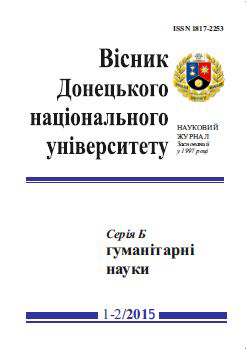Традиційні засади соціальної реальності.
Ключові слова:
традиційне суспільство, соціальна реальність, історична пам’ять, традиція, новаторство, модернізаціяАнотація
Розглянуто духовні основи соціальної реальності заснованої на уявленнях традиційних суспільств. Визначено міждисциплінарність у методологічних підходах дослідження традиційних основ соціальної реальності. Реконструйовано процес формування традиції протягом історичного процесу. З’ясовано теоретичні механізми відновлення історичної пам’яті, шляхи утворення різних видів традицій, значення традицій у соціокультурному розвитку суспільної реальності.Посилання
Вебер М. Основные социологические понятия / М. Вебер. // Избранные произведения. / Пер. с нем.; сост., общ. ред. и послесл. Ю.Н. Давыдова; предисл. П.П. Гайденко; коммент. А.Ф. Филиппова. – М.: Прогресс, 1990. – 764 с.; Шютц А. Смысловая структура повседневного мира: очерки по феноменологической социологии / Сост. А. Я. Алхасов; Пер. с англ. А. Я. Алхасова, Н. Я. Мазлумяновой; Научн. ред. перевода Г. С. Батыгин. – М.: Институт Фонда «Общественное мнение», 2003. – 336 с.
Фуко М. История безумия в классическую эпоху / М. Фуко. – СПб, 1997. – 576 с.; Шацкий Е. Утопия и традиция / Е. Шацкий. / Пер. с пол. – М.: Прогресс, 1990. – 455 с.; Шилз Э. О содержании термина «традиция». Сравнительное изучение цивилизаций / Э. Шилз. / Хрестоматия. / Сост., ред. и вступ. ст. Б.С. Ерасов. – М.: Аспект Пресс, 1998. – С. 240-245; Штомпка П. Социология социальных изменений / П. Штомпка. / Пер. с англ. под ред. В.А. Ядова. – М.:Аспект Пресс, 1996. – 416 с.
Забужко О. Філософія української ідеї та європейський контекст: франківський період / О. Забужко. – К.: Факт, 2006. – 156 с.; Попович М.В. Нарис історії культури України / М.В. Попович. – К.: «АртЕк», 1998. – 728 с.; Власюк О.С. Український соціум / О.С. Власюк, В.С. Крисаченко, М.Т. Степико та ін. / За ред. В.С. Крисаченка. – К.: Знання України, 2005. – 792 с.; Борисова Ю.В. Традиціоналістські та модерністські цінності в структурі молодіжної ціннісної свідомості: соціологічний аналіз: Автореф. дис... канд. соціол. наук: 22.00.01 / Ю.В. Борисова. / Харків. нац. ун-т ім. В.Н. Каразіна – Харків, 2001. – 18 с.
Гнатюк О. Прощання з імперією: Українські дискусії про ідентичність / О. Гнатюк. – К.: Критика, 2005. – 528 с.
Ассман Я. Культурная память: Письмо, память о прошлом и политическая идентичность в высоких культурах древности / Я. Ассман. / Пер. с нем. М.М. Сокольской. – М.: Языки славянской культуры, 2004. – 368 с.
Шейко О.С. Традиція як фактор саморозвитку суспільства: Автореф. дис... канд. філос. наук: 09.00.03 / О.С. Шейко. / Запоріз. держ. ун-т. – Запоріжжя, 2001. – 21 с.
Абушенко В.Л. Традиция // Новейший философский словарь: 3-е изд., исправл. / В.Л. Абушенко. – Мн.: Книжный Дом, 2003. – С. 1047.
Шилз Э. О содержании термина «традиция». Сравнительное изучение цивилизаций / Э. Шилз. / Хрестоматия. / Сост., ред. и вступ. ст. Б.С. Ерасов. – М.: Аспект Пресс, 1998. – С. 240-245.
Макаров А.И. Традиционализм / А.И. Макаров, А.И. Пигалев. // История философии. Энциклопедия. – Минск. – 2002. – С. 183-186.
Фуко М. История безумия в классическую эпоху / М. Фуко. – СПб, 1997. – 576 с.
Штомпка П. Социология социальных изменений / П. Штомпка. / Пер. с англ. под ред. В.А. Ядова. – М.:Аспект Пресс, 1996. – 416 с.
Філософський енциклопедичний словник. / Під ред. В.І. Шинкарука. – К.: Абрис, 2002. – 744 с.

